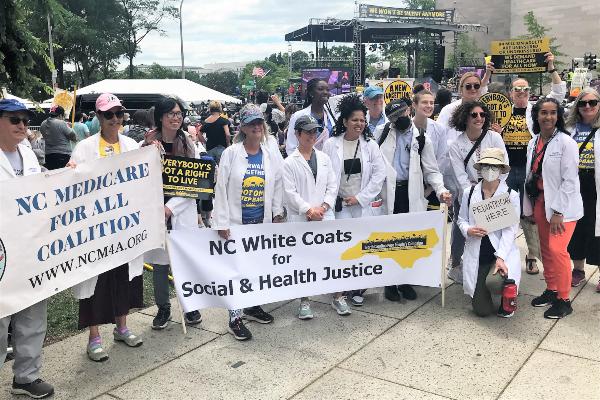
Thousands gathered on Saturday, June 18th, for The Poor People's and Low-Wage Workers' Assembly and Moral March in Washington, DC.
A group of Duke Physician Assistant (PA) Program students and faculty attended with the North Carolina chapter of White Coats for Social and Health Justice.
The Poor People's Campaign: A National Call for Moral Revival is rooted in the 1968 Poor People's Campaign led by Dr. Martin Luther King Jr.
The Washington, DC event addressed many issues disproportionately affecting poor and low-income Americans, including health care, housing, gun violence, abortion rights, and labor conditions.
Professor Perri Morgan, PhD, PA-C, felt attending the march was important because "it has become more and more clear that it takes more than health care for people to be healthy. People's health is also dependent on housing, food, environmental quality, bodily autonomy."
Summing up the movement, Morgan said, "There is no health justice without social justice."
First-year Duke PA student Kendra Ireigbe felt the representation she brought to the march was important. This was validated in a conversation she and Clinical Education Director Alicia Bolden, DMSc, MPH, PA-C, had with another participant.
"Dr. Bolden and I had the opportunity to be stopped by a mom (who was African American). She was so excited to see us. She was glad there was someone her daughter could look up to and realize that anyone of any race and gender can be a provider and help bridge these health disparities. Sadly, the population that has to suffer the most from these medical shortcomings and social injustices are the underrepresented population. When they see people who are similar to them fighting to help these causes it not only gives them hope, it is also a driver for the younger population to join the fight."
First-year student Lily McWilliams explained one of the direct connections between poverty and wellness, "Beyond the necessity of meeting basic needs to survive and maintain health, we've learned that poverty and oppression chronically stimulate sympathetic nervous systems leading to many of the comorbidities we see as major mortality contributors in the US. Our classes also teach us we cannot simply treat our patients without considering all the factors that contribute to their well-being."
Indeed, social determinates of health (SDOH) are an important and integrated part of the Duke PA Program curriculum.
According to the US Department of Health and Human Services (DHHS), social determinants of health are defined as, "the conditions in the environments where people are born, live, learn, work, play, worship, and age that affect a wide range of health, functioning, and quality-of-life outcomes and risks."
The DHHS website explains, "SDOH also contribute to wide health disparities and inequities. For example, people who don't have access to grocery stores with healthy foods are less likely to have good nutrition. That raises their risk of health conditions like heart disease, diabetes, and obesity — and even lowers life expectancy relative to people who do have access to healthy foods.
"Just promoting healthy choices won't eliminate these and other health disparities. Instead, public health organizations and their partners in sectors like education, transportation, and housing need to take action to improve the conditions in people's environments."
White Coats for Social and Health Justice works to highlight the vital relationship between socioeconomic factors and overall health.
McWilliams said, "I think the presence of white coats at the march showed we recognize the connection between social justice and health justice and that we support legislative actions to help with these issues. Many people at the march seemed to really appreciate and feel uplifted by having the white coat presence there."